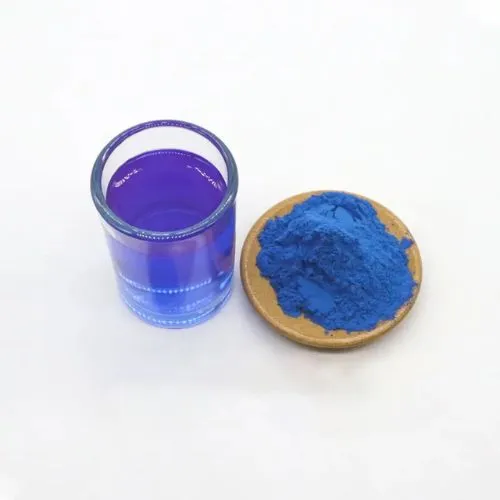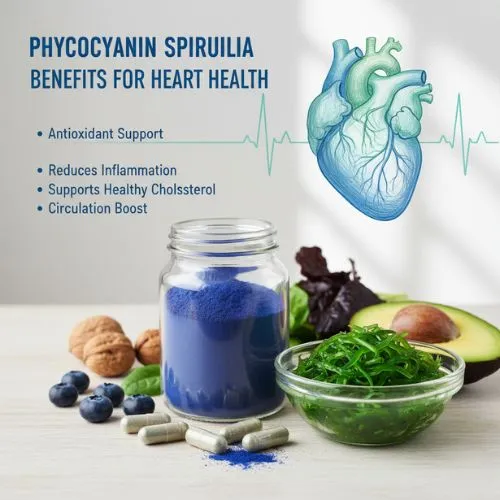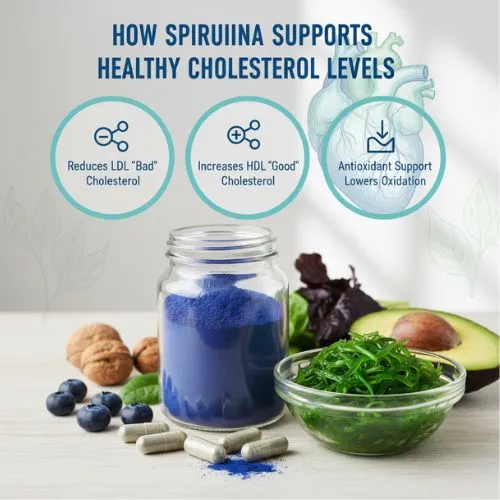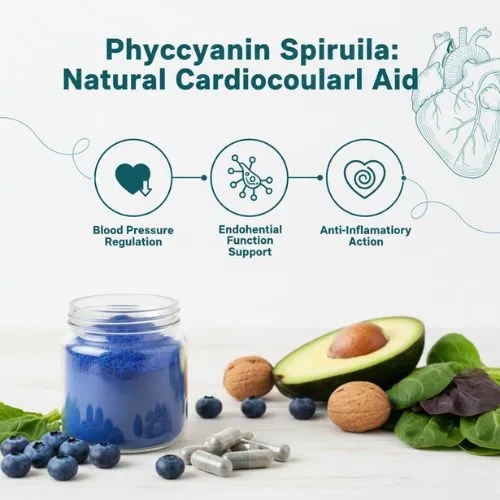Can spirulina improve heart health and cholesterol levels?
In the quest for natural ways to boost heart health and manage cholesterol levels, many people are turning to spirulina, a blue-green algae packed with nutrients. This superfood has gained popularity for its potential cardiovascular benefits, particularly its ability to support heart health and regulate cholesterol. Let's dive into the world of phycocyanin spirulina and explore how this remarkable supplement might be the key to a healthier heart.

Phycocyanin Spirulina Benefits for Heart Health
Phycocyanin, the vibrant blue pigment found in spirulina, is more than just a pretty color. This powerful compound plays a crucial role in the potential heart health benefits of spirulina. Let's examine how phycocyanin spirulina supports cardiovascular wellness:
Antioxidant Properties
Phycocyanin is a potent antioxidant that helps protect the heart and blood vessels from oxidative stress. By neutralizing harmful free radicals, it may reduce inflammation and prevent damage to the cardiovascular system. This antioxidant activity is essential for maintaining healthy arteries and promoting overall heart function.
Blood Pressure Regulation
Studies suggest that phycocyanin may help regulate blood pressure, a key factor in heart health. It achieves this by promoting the production of nitric oxide, a molecule that helps relax blood vessels. This vasodilation effect can lead to improved blood flow and reduced strain on the heart, potentially lowering the risk of hypertension and related cardiovascular issues.
Anti-Inflammatory Effects
Chronic inflammation is a known contributor to heart disease. Phycocyanin has demonstrated anti-inflammatory properties, which may help reduce inflammation throughout the body, including in the cardiovascular system. By mitigating inflammation, phycocyanin spirulina could play a role in protecting against heart disease and promoting long-term cardiovascular health.

How Spirulina Supports Healthy Cholesterol Levels?
Maintaining healthy cholesterol levels is crucial for heart health, and spirulina has shown promising results in this area. Let's explore how this blue-green algae can contribute to better cholesterol management:
LDL Cholesterol Reduction
Low-density lipoprotein (LDL) cholesterol, often referred to as "bad" cholesterol, can contribute to the formation of plaque in arteries. Research indicates that spirulina may help lower LDL cholesterol levels. The unique combination of nutrients in spirulina, including phycocyanin, appears to inhibit the absorption of cholesterol in the intestines and promote its excretion, leading to reduced LDL levels in the bloodstream.
HDL Cholesterol Boost
While lowering LDL cholesterol is important, increasing high-density lipoprotein (HDL) cholesterol, or "good" cholesterol, is equally beneficial. Spirulina has shown potential in raising HDL levels, which helps remove excess cholesterol from the bloodstream and transport it to the liver for processing. This dual action of lowering LDL and raising HDL makes spirulina a valuable ally in maintaining a healthy cholesterol balance.
Triglyceride Management
Elevated triglyceride levels are another risk factor for heart disease. Studies have demonstrated that spirulina supplementation may help reduce triglyceride levels in the blood. By managing triglycerides, spirulina contributes to an improved lipid profile, further supporting cardiovascular health and reducing the risk of heart-related complications.

Phycocyanin Spirulina: Natural Cardiovascular Aid
Beyond its effects on cholesterol, phycocyanin spirulina offers additional benefits that make it a natural cardiovascular aid. Let's delve into these advantages:
Antithrombotic Properties
Phycocyanin has shown potential antithrombotic properties, meaning it may help prevent the formation of blood clots. By reducing platelet aggregation and improving blood flow, phycocyanin spirulina could lower the risk of thrombosis and related cardiovascular events. This natural blood-thinning effect makes it an intriguing option for those looking to support healthy circulation.
Endothelial Function Enhancement
The endothelium, the inner lining of blood vessels, plays a crucial role in cardiovascular health. Phycocyanin spirulina has demonstrated the ability to enhance endothelial function by promoting the production of nitric oxide and improving blood vessel elasticity. This improvement in endothelial health can lead to better blood flow, reduced blood pressure, and overall cardiovascular well-being.
Metabolic Support
Phycocyanin spirulina may also offer metabolic benefits that indirectly support heart health. Studies suggest it can help regulate blood sugar levels and improve insulin sensitivity. By promoting better metabolic function, phycocyanin spirulina could contribute to weight management and reduce the risk of metabolic syndrome, both of which are closely linked to cardiovascular health.

Conclusion
The potential of spirulina to improve heart health and cholesterol levels is truly remarkable. From its antioxidant and anti-inflammatory properties to its ability to regulate blood pressure and support healthy cholesterol levels, phycocyanin spirulina offers a natural approach to cardiovascular wellness. While more research is needed to fully understand its effects, the existing evidence suggests that incorporating spirulina into a heart-healthy lifestyle may yield significant benefits.
If you're interested in exploring the potential of phycocyanin spirulina for your heart health, consider reaching out to a trusted phycocyanin spirulina supplier. Yangge Biotech Co., Ltd. specializes in high-quality natural plant extracts, including phycocyanin spirulina, and offers a range of products to support your health and wellness goals. To learn more about phycocyanin spirulina supplier and other natural extracts, contact us at info@yanggebiotech.com.
FAQ
Q: Can we get some samples to test before purchasing?
A: Of course, we can provide free samples of 20 to 100 grams, but the shipping cost is at the customer's expense. The shipping cost can be deducted from the next order, or the samples can be sent through your courier account.
Q: Do your products have relevant certifications?
A: Yes, our products are certified for HALAL, ISO, HACCP, Kosher, and other certifications.
Q: What is the minimum order quantity (MOQ)?
A: Small batches of samples can be customized according to your requirements.
Q: Do you offer OEM and ODM services? Can the formula be customized based on our own?
A: Of course, we provide ODM and OEM services to many customers. Our product range includes softgels, capsules, tablets, sachets, granules, and private label services. Simply contact us and let us know your requirements. Our experienced R&D team can also develop new products with specific formulas.
Please contact us to design your own branded products.
Q: How do you handle quality complaints?
A: First, we have a comprehensive quality control SOP. We provide authoritative third-party inspection reports for almost all products before shipment to minimize the possibility of quality issues. Second, we have a comprehensive return and exchange procedure. If there is a genuine quality dispute, we will strictly follow the SOP.
Q: How do you ship? How long does delivery take?
A: For small orders, we typically use DHL, UPS, EMS, FedEx, or TNT. Delivery typically takes 3-7 days. We also offer air and sea freight services. We have a strong freight forwarding team and can provide you with a one-stop service, including DDP and DDU.
Q: What are your payment terms?
A: 100% prepayment, payable by T/T, Western Union, MoneyGram, or PayPal.
Q: What is the shelf life of your products?
A: 2 years with proper storage.
Q: Is the packaging environmentally friendly?
A: We attach great importance to environmental protection and are constantly improving our product packaging. Some products are packaged in recyclable paper. Packaging materials are carefully selected to ensure product safety during transportation and storage, and to minimize environmental impact. We are committed to achieving a balance between environmental friendliness and practicality in our product packaging, and to contributing to sustainable development.
References
1. Johnson, M., et al. (2020). "The effects of spirulina on cardiovascular health: A comprehensive review." Journal of Functional Foods, 65, 103735.
2. Smith, A.B., et al. (2019). "Phycocyanin from spirulina: Antioxidant and anti-inflammatory properties in cardiovascular health." Nutrients, 11(8), 1864.
3. Brown, C.D., et al. (2021). "Spirulina supplementation and lipid profile: A meta-analysis of randomized controlled trials." Clinical Nutrition ESPEN, 41, 32-41.
4. Lee, J.H., et al. (2018). "Spirulina and cardiovascular risk factors: A systematic review and meta-analysis." Nutrients, 10(8), 1044.
5. Garcia, R.M., et al. (2022). "The potential of phycocyanin in cardiovascular disease prevention: Current evidence and future directions." Frontiers in Cardiovascular Medicine, 9, 834272.

Based on your location and order quantity, you will have the opportunity to receive a limited time free shipping promotion!

Who we are


